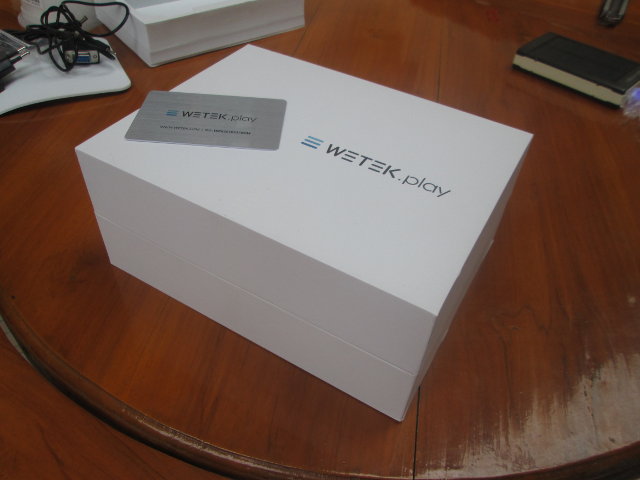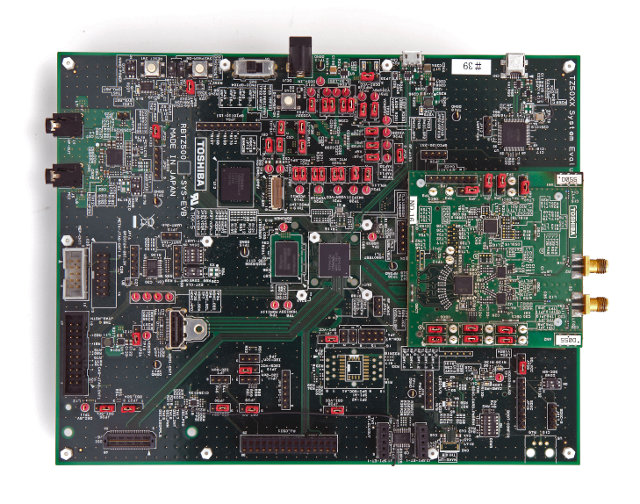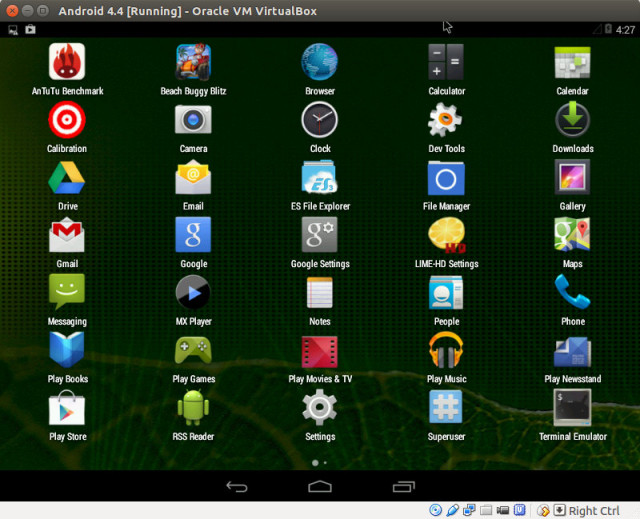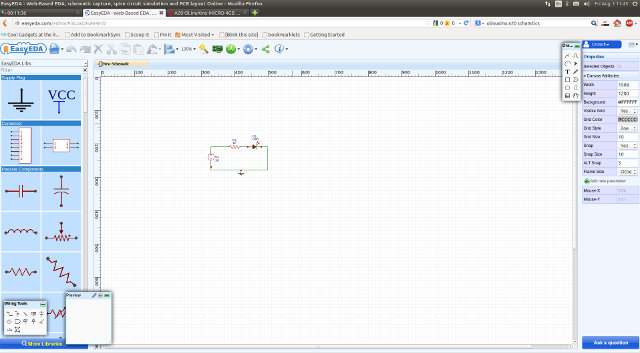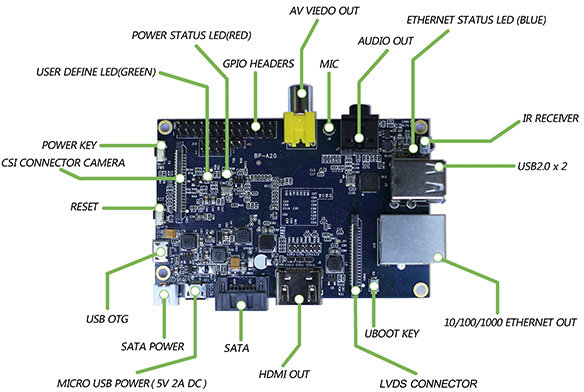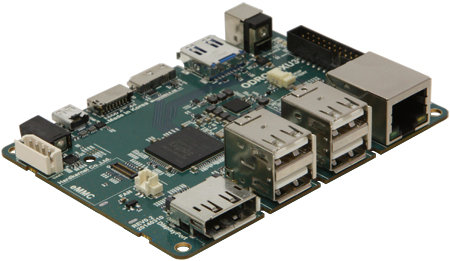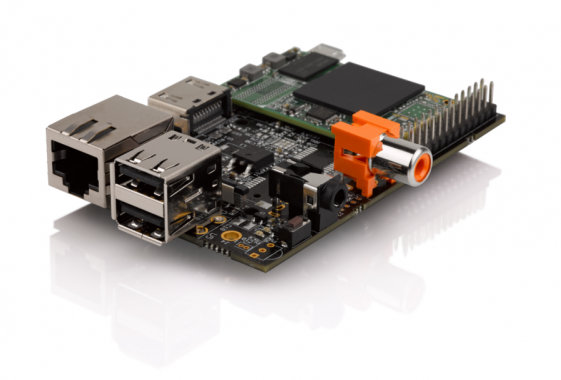WeTek Electronics, a company based in Hong Kong, has sent me an Android TV powered by Amlogic AML8726-MX dual core Cortex A9 processor. Nothing new here, but I was very very interested in reviewing it because it includes a DVB-S2 tuner, and on top of their stock Android firmware, the company provides various Android and Linux firmware files such as CyanogenMod, ParanoidAndroid, OpenELEC, Linux with Enlightenment desktop environment, Lubuntu 14.04 and so on. Today, I’ll list the hardware specifications of the device, show some unboxing pictures and video, and as usual, open the device to see what’s inside. I’ll provide a full review in one or two more posts. WeTek Play Specifications Apart from the DVB-S2 tuner are the serial port, the hardware specifications sound familiar: SoC – Amlogic AML8726-MX dual core Cortex A9 @ 1.5GHz with Mali-400MP GPU System Memory – 1GB DDR3 Storage – 4 GB NAND flash […]
Toshiba TZ5000 ApP Lite Media Player Development Kits Run Android 4.4 and Ubuntu Linux
Toshiba has recently announced two development kits powered by their TZ5000 ApP Lite SoC featuring two ARM Cortex A9 cores, PowerVR SGX540 GPU, PowerVR VXD395 GPU, an optional 4GB MLC NAND, and Ensigma C4500 Wi-Fi baseband engine into a single chip solution that targets Over-The-Top (OTT) tuners and IP media boxes, wearable devices, digital signage, thin clients, and more. The first development kit, RBTZ5000-6MA-A1, is a full size board that supports Ubuntu, the other one, RBTZ5000-6MA-A1, is an HDMI stick form factor board running Android 4.4. Toshiba RBTZ5000-2MA-A1 Board (Ubuntu) RBTZ5000-2MA-A1 Starter Kit specifications: SoC – Toshiba TZ5011XBG dual core Cortex A9 processor @ 1.0 GHz with PowerVR VPU and GPU, and Ensigma C4500 Wi-Fi baseband engine System Memory – DDR3L-1600 Storage – 8GB eMMC (external) + MicroSDXC Connectivity – Wi-Fi 802.11a/b/g/n/ac 2×2 MIMO (via Ensigma C4500), Bluetooth 4.0. Ethernet is available via a daughter board connected to ADB. USB […]
Android-x86 4.4 Stable Released for x86 Computers, Laptops, Netbooks…
There are several methods to run Android in an x86 computer or laptop, but Android-x86 could be one of the best to do that, and the developers have just released the first stable release for Android-x86 4.4 Kitkat. This release includes support for OpenGL ES hardware acceleration for AMD Radeon and Intel graphics, ffmpeg integration to support HD video playback in apps, and more. The file to download is android-x86-4.4-r1.iso, which you can then install on a USB flash drive:
|
1 |
sudo dd if=android-x86-4.4-r1.iso of=/dev/sdX |
where /dev/sdX is the device name of your usb drive. If you are a Windows users you can use Win32DiskImager utility instead. Android should then boot from USB, and you can decide to run it from USB or install it on you hard drive. I haven’t done this, but instead, I’ve created a new Linux 32-bit virtual machine in VirtualBox without internal storage to try it out quickly in […]
EasyEDA is a Web-based Schematics Capture, Simulation, and PCB Layout Tool
I recently watched a video showing AllWinner R&D, and I noticed although most (all?) software engineer run Ubuntu in the PC, the hardware engineers all relied on Windows based EDA tools for schematics capture and PCB Layout. There are already Linux-based tools such as Kicad, which appears to be good for new projects, but importing existing projects can be an issue. An alternative to operating system dependent EDA software suites are web-based tools. I’ve already tried Fritzing which allows to draw circuits on breadboard, convert these to schematics and PCB layouts, and order the PCBs. It looks pretty good for its purpose, but it’s limited to mostly simple designs, and AFAIK can’t be used to replace an EDA suite. That’s where EasyEDA comes into play. It’s a web-based tool where you can draw schematics, perform simulation, and create PCB layouts for your project, either keeping them private, or sharing them […]
Linaro 14.07 Release with Linux Kernel 3.16 and Android 4.4
Linaro 14.07 has just been released with Linux Kernel 3.16-rc6 (baseline), Linux Kernel 3.10.50 (LSK), and Android 4.4.4. This month, Linaro has continued development on Juno 64-bit ARM development board, as well as other member boards from Broadcom (Capri), Qualcomm (IFC6410), Hisilicon D01, Samsung (Arndale / Arndale Octa), etc.. Android have been upgraded to version 4.4.4 with images released for Pandaboard, Arndale, Nexus 10, and Nexus 7, built with Linaro GCC 4.9. Here are the highlights of this release: Linux Linaro 3.16-rc6-2014.07 released GATOR version 5.18 (same version as in 2014.04) updated basic Capri board support from Broadcom LT. Good progress in upstreaming the code: now the topic has 21 patch on top of v3.16-rc4 vs 53 patches on top of v3.15 in 2014.06 cycle removed cortex-strings-arm64 topic as the code is accepted into the mainline new topic from Qualcomm LT to add IFC6410 board support updated Versatile Express ARM64 […]
Lemaker.org is Giving Away Banana Pi Development Boards to Developers and Fans
Banana Pi is a development board powered by AllWinner A20 dual core SoC with 1GB RAM, and with expansion headers and a form factor very similar to the Raspberry Pi. It can run Debian, Lubuntu, Android 4.2, Arch Linux ARM, Scratch OS, and OpenSuse, but Lemarker.org community would like more educational materials such as open source software or hardware projects, tutorials, etc.., so they’ve launched a program to give away boards to developers and people who can help writing and maintaining documentation. There are three categories of projects: STEAM – “Science, Technology, Engineering, Art & Mathematics” educational, open source projects running on the the Banana Pi Hardware or Software Project – Open source projects based on Banana Pi which could be helpful to the community, including open source hardware peripherals projects; Banana Pi Fans – You don’t need to be as technical as for the two others categories, but you […]
Hardkernel Unveils $179 ODROID-XU3 Development Board Powered by Samsung Exynos 5422 SoC
Remember ODROID-XU2 development board based on Exynos 5420? The bad news is that it apparently got scrapped, but the good news is that it gave birth to ODROID-XU3 development board powered by the latest Samsung Exynos 5422 octa core big.LITTLE SoC with support for Ubuntu 14.04 and Android 4.4, including GPU 3D acceleration with the company promising a full desktop experience in Ubuntu. ODROID-XU3 specifications: SoC – Samsung Exynos 5422 quad core ARM Cortex-A15 @ 2.0GHz+ quad core ARM Cortex-A7 @ 1.4GHz with Mali-T628 MP6 GPU supporting OpenGL ES 3.0 / 2.0 / 1.1 and OpenCL 1.1 Full profile System Memory – 2GB LPDDR3 RAM PoP (933Mhz, 14.9GB/s memory bandwidth, 2x32bit bus) Storage – Micro SD slot (up to 64GB) + eMMC 5.0 module socket (16, 32, or 64GB module available) Video Output – micro HDMI (Up to 1080p) and DisplayPort (up to 2160p) Audio Output – micro HDMI and […]
SolidRun HummingBoard Raspberry Pi-Like Board is Now Available for $45 and Up
HummingBoard is a board made by SolidRun that’s mechanically compatible with the Raspberry Pi, and offering the same expansions connectors, and a few extras. The board is comprised of a baseboard and a microSoM powered by Freescale i.MX6 Solo, Dual Lite or Dual. At first it looked like an internal project, but the board went viral together with the Banana Pi, and the company has now announced availability for the HummingBoard with pricing starting at $45 for the single core version up to $100 for the dual core version with extra options. There are currently three models: HummingBoard-i1 ($44.90) – Freescale i.MX6 Solo with GC880 GPU, 512 MB RAM, 10/100M Ethernet HummingBoard-i2 ($74.99) – Freescale i.MX6 Dual Lite with GC880 GPU, 1GB RAM, 10/100M Ethernet HummingBoard-i2ex ($99.99) – Freescale i.MX6 Dual with GC2000 GPU, 1GB RAM, Gigabit Ethernet, LVDS output, mSATA II interface, PCI Express Gen 2 slot, RTC with […]


